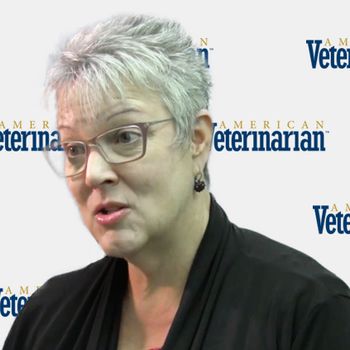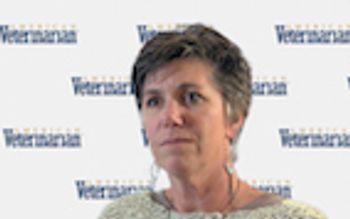
Ray Ramirez, DVM, owner and speaker of Ramirezdvm.com, explains how to start using humor in the veterinary practice.

Ray Ramirez, DVM, owner and speaker of Ramirezdvm.com, explains how to start using humor in the veterinary practice.

Ray Ramirez, DVM, owner and speaker of Ramirezdvm.com, explains when it’s inappropriate to use humor in the veterinary practice.

Ray Ramirez, DVM, owner and speaker of Ramirezdvm.com, discusses what usually goes wrong when a joke doesn’t work.

Ray Ramirez, DVM, owner and speaker of Ramirezdvm.com, explains how humor can help create a bond between a veterinarian and their client.

Karl Salzsieder, DVM, JD, CVA, Owner of Salzsieder & Associates, TPSG, LLC / DBA Total Practice Solutions—Northwest, discusses why fewer veterinarians are buying into or starting their own veterinary practices.

Karl Salzsieder, DVM, JD, CVA, Owner of Salzsieder & Associates, TPSG, LLC / DBA Total Practice Solutions—Northwest, gives advice to young veterinarians who are looking to buy a practice.

David Liss, RVT, VTS, CVPM, program director at Platt College, discusses the changing role of the veterinary technician.

Some of us want attention when we're hurting. Clients should know their pets tend to bury the fact.

David Liss, RVT, VTS, CVPM, program director at Platt College, discusses the need for critical thinking in clinical pathology.

This highly educated veterinary technician wants practice managers to know it's time to finally use her and her colleagues so veterinarians work more efficiently.

Camala Bailey, CPA, CVA, at Camala C. Bailey, CPA, PC, discusses the importance of tracking payroll within your veterinary practice.

Anthony Carr, DMV, DACVIM (SAIM), professor at University of Saskatchewan, discusses treatment options for dogs that developed hypertension as a complication of Cushing’s disease.

The tooth-seeking adventure continues with Mary Berg and the deceptive dental radiograph discovery.

Most people loathe digging into financial details. But a diligent approach will help your project succeed.

Rebecca Rose, CVT, president and founder of Catalyst Veterinary Practice Consultants, discusses the benefits of national credentialing for veterinary technicians.

Rebecca Rose, CVT, president and founder of Catalyst Veterinary Practice Consultants, explains the pragmatic approach NAVTA is taking towards determining whether or not veterinary technicians will be called veterinary nurses.

Camala Bailey, CPA, CVA, at Camala C. Bailey, CPA, PC, discusses how veterinarians can reduce their fixed expenses.

Ray Ramirez, DVM, owner and speaker of Ramirezdvm.com, discusses the benefits of using humor in the clinical setting.

M. Scott Echols, DVM, ABVP, owner of Echols Veterinary Services, explains how and why enrichment strategies should vary across bird species.

Patients will tell you plenty about their emotional state if you simply pay attention.

Brian Faulkner, Bsc (Hons), BVM&S, CertGP (BPS), CertGP (SAM), MBA, MSc (Psych), MRCVS, explains strategies for veterinarians to communicate complex diagnoses with confidence.

M. Scott Echols, DVM, ABVP, owner of Echols Veterinary Services, discusses whether or not pet owners value smaller birds as much as they value larger ones.

Better vaccinations, kinder physical exams and taking time to relax and reward pets in the veterinary practice are all crucial parts of creating a lower-stress visit. But if you don't tell pet owners why you're doing and why, you're leaving it to them to guess.

Brian Faulkner, Bsc (Hons), BVM&S, CertGP (BPS), CertGP (SAM), MBA, MSc (Psych), MRCVS, discusses how he works with young veterinarians to develop their confidence.

Meri Hall, RVT, CVT, LVT, LATG, VTS (SAM), veterinary technician of internal medicine, from Veterinary Specialty Hospital of Palm Beach Gardens, outlines the four most common stressors that cause hyper-grooming and interstitial cystitis.

Putting these tips into use if your animal housing can lead to fewer stressed-out pets.

Valerie Fadok, DVM, PhD, DACVD, dermatologist in the Veterinary Specialty Team at Zoetis, discusses methods to prevent the transmission of dermatophytes from animals to humans.

CVC Speaker Dr. Betsy Charles points to Apollo 13 as out-of-this-world leadership.

There's always a chance an owner of a pet with lymphoma might change their mind about trying chemotherapy, so don't start at a disadvantage.

Meri Hall, RVT, CVT, LVT, LATG, VTS (SAM), veterinary technician of internal medicine, from Veterinary Specialty Hospital of Palm Beach Gardens, discusses some steps that can prevent the spread of infectious diseases in the veterinary hospital.